What Happens in Julie, Monster
The legendary Julie d’Aubigny is dead. She “lived for adventure and died for love.” As the overture plays, the action flashes back to Julie’s teenage years. Fleeing from a bad marriage, Julie gives fencing and singing demonstrations for money with her companion Sérannes. They wind up in Marseilles, where they scheme to get into the city’s opera company.
Julie is taken in by the family of a rich physician, Bortigali. When his daughter Cécilia begins a love affair with Julie, Julie is expelled from the house and Cécilia is sent to a nunnery. Julie infiltrates the convent to free Cécilia, but while escaping, they accidentally burn the convent down. On the run, they realize their aspirations are different and split up.
In a rage, Julie assaults three men, wounding one. Tending to his wounds at an inn, Julie tells him she is a “monster,” atheistic, nonbinary, capable of both destruction and love. The man, Luynes, is intrigued. Guards arrive to arrest Julie for her crimes at the convent. Luynes rescues her by revealing that he is a prince and buying the inn to give her sanctuary until he can secure her pardon from the King. Not one to wait passively, Julie escapes out a window.
Meanwhile, Sérannes hears that Julie has been arrested and, incorrectly, that Luynes is dead. Impersonating Luynes, Sérannes hastens off to Versailles. There he runs into Luynes, very much alive. They fight and then go to King Louis together to advocate for Julie, but are unsuccessful. A short while later, Julie invades the king’s chamber. Intrigued by her audacity, Louis spares her life.
The action shifts to Paris, where Julie has become a sensation on the opera stage. At a dinner, Sérannes announces he is dying from alcoholism. A surprise visitor appears: Gaultier, come from Marseilles to visit his proteges. He brings disturbing news: Cécilia’s attempt to find a new life in the countryside ended in her murder.
Julie next appears at an all-women salon hosted by the free-thinking noblewoman Marie-Thérèse. Marie-Thérèse introduces Julie to a hidden world of female creativity, and a new love blossoms. The couple enjoy domestic bliss in the noblewoman’s townhouse until Marie-Thérèse becomes pregnant by her husband and must go back to her country estate. Alone in the townhouse, Julie receives the devastating news that Marie-Thérèse died in a smallpox outbreak.
Julie withdraws to the countryside. A recluse, she receives a visit from Luynes, who is being banished from France for dueling. He invites her to go to Germany with him, but Julie declines. They bid each other a final adieu.
Julie retires to her bed. Days pass and visions come to her: Sérannes and Cécilia reporting on a future world where same-sex love is celebrated and women can choose their life course. She spurns them, hoping only to see Marie-Thérèse. Finally, the spirit of Marie-Thérèse appears and tells Julie she has triumphed by living life on her own terms. Unable to touch the spirit, Julie becomes distraught. The spirit relents and takes Julie’s hand. They walk off into the darkness.

